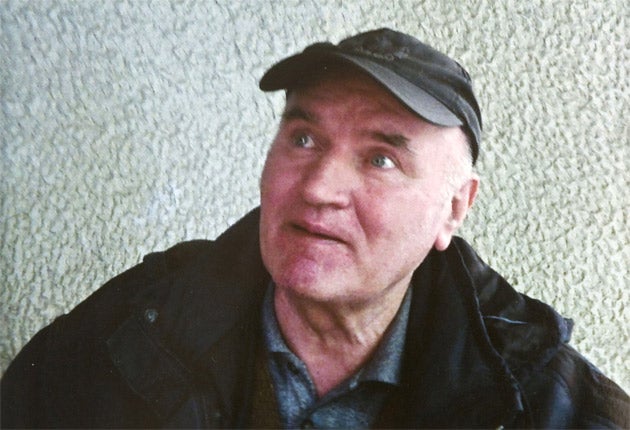'Co-operative' Mladic awaits his day in court

Your support helps us to tell the story
From reproductive rights to climate change to Big Tech, The Independent is on the ground when the story is developing. Whether it's investigating the financials of Elon Musk's pro-Trump PAC or producing our latest documentary, 'The A Word', which shines a light on the American women fighting for reproductive rights, we know how important it is to parse out the facts from the messaging.
At such a critical moment in US history, we need reporters on the ground. Your donation allows us to keep sending journalists to speak to both sides of the story.
The Independent is trusted by Americans across the entire political spectrum. And unlike many other quality news outlets, we choose not to lock Americans out of our reporting and analysis with paywalls. We believe quality journalism should be available to everyone, paid for by those who can afford it.
Your support makes all the difference.Ratko Mladic will appear before the International Criminal Tribunal for the Former Yugoslavia (ICTY) tomorrow when the man accused of murdering up to 8,000 Muslim boys and men in Srebrenica in 1995 is expected to plead not guilty to charges of genocide.
After evading justice for 16 years, the hearing is expected to be the start of a lengthy legal process that could last until 2014. Mladic's legal team have already argued the former Bosnian Serb commander will die before the end of the trial.
Despite the legal wrangling, which was unable to prevent Mladic's speedy extradition earlier this week, officials at the ICTY said Mladic was coherent during initial interviews on Tuesday evening. The tribunal's registrar John Hocking said yesterday that Mladic had been "extremely co-operative". He said the 69-year-old suspect appeared to understand his questions and the outline of the case against him.
Mr Hocking said that a doctor who examined Mladic saw no immediate medical problems that would prevent him from being taken to the tribunal's detention unit, where he will stay in solitary confinement until tomorrow's hearing. Rarely pictured without his camouflaged army uniform and his Serbian officer's cap in the past, he was wearing a suit and tie as he stepped from the helicopter on Tuesday evening.
"I can state categorically he is not on suicide watch," Mr Hocking said in answer to a question during a press conference yesterday. "At this stage there was no need to place him on suicide watch." Mladic was quoted in the past as saying he would rather take his own life than end up at The Hague tribunal. When arrested last Thursday he had two guns but made no attempt to use them. The Bosnian ambassador to The Netherlands, Miranda Sidran Kamisalic, said Mladic was "talkative, focused and rational" when she met him at the Rotterdam-Hague airport on Tuesday evening. "He wanted to hear my name, he was interested in what city I came from, he wanted to know which district of Sarajevo I live in," she said. Mladic has Bosnian and Serbian citizenship.
More details emerged yesterday about what conditions Mladic can expect during his detention. As well as a 15 square metre cell with amenities like a TV and a computer, he will be provided with regular health care, will be able to take regular exercise. He will also have access to a spiritual counsellor and an English tutor
Cells are locked from 9pm-7.30am, while in the meantime the inmates can prepare their defence, talk to each other and even cook, if not satisfied with Dutch food. Mladic will also be allowed to have family visits that are monitored but not recorded, which will be paid for by Serbia. He will have to pay for his own defence and it is still unknown if he has appointed any lawyers.
The tribunal's chief prosecutor, Serge Brammertz, said at a press conference yesterday that the arrest of Mladic "has been long awaited" and that the crimes he is accused of have "shocked the conscience of international community".
According to Mr Brammertz, the forthcoming trial against Mladic will have "bigger political consequences than the arrest," a reference to the reconciliation between the former warring nations.
"His [Mladic's] arrest confirms that no one can count on impunity for war crimes," Mr Brammertz said. He also confirmed that steps are being taken to speed up the trial, as in the past several war crimes cases have taken years before finally coming to an end.
Join our commenting forum
Join thought-provoking conversations, follow other Independent readers and see their replies
Comments